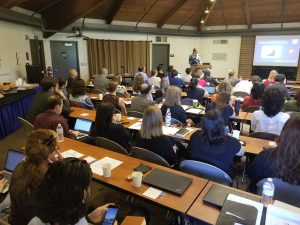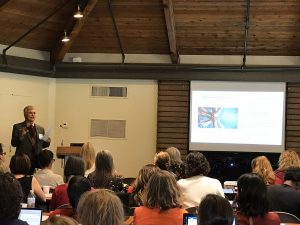Professional conferences help us stay sharp.
In late October, I co-presented two sessions at a conference for the National Organization for Research Development Professionals. NORDP has been a valuable professional organization for me and has allowed me to network with other research development professionals from around the country. A layperson might think of it as an organization for grant writers, but we are more than grant writers.
While we do help faculty prepare, submit, and manage grants, we also help institutions establish best-practices for grants management and sponsored projects offices (SPO). And on a very personal level, we help faculty develop as professionals by assisting them as they think through their research agendas and funding aspirations, through coaching, mentoring, and supporting faculty in very individualized ways. While the goals of an SPO are to support an institution’s mission, research developers also support faculty development and help faculty members sustain themselves as professionals in their fields.

NORDP members watching a presentation by Mark, Lagrimini, Vice Provost of Research and Extension, UC Agriculture and Natural Resources: “Leveraging Strengths in the West: Diversity, Excellence, and Partnership.”
The conference was at UC Davis and had 75 attendees. It was a regional conference. The national conference can see upwards of 700 in attendance. And with a membership of around 1,000 people, a 70% conference attendance rate is a testament to how valuable this organization is. The regional conference included sessions:Responding to Change: Sustaining Research Development in the Current and Future Funding Environment
- Strategies for Developing Complex Proposals
- Integrating Research Development in Cross-Campus Partnerships
and more.

WOU SPO team member Eric Dickey presenting “Professional Development Tactics to Consider at Each Stage of Your Career”
I co-presented with my longtime friend and colleague from Oregon State University, Susan Emerson, a session called, “Professional Development Tactics to Consider at Each Stage of Your Career.” The session helped attendees think about themselves and their career aspirations. Whether new to research, mid-career, or at career’s end, research developers, like the faculty we serve, should develop strategies and goals as they move through their careers. This is as simple as taking advantage of workshops, cultural competency training, financial planning, and more. We introduced the attendees to the concept of curating ourselves. What are our strengths, and how can we work through our weaknesses? The presentation was very well-received, and surprisingly, even the most advanced professionals had not thought of themselves in this way.
The other and more relevant session to my work at WOU was on, “Creating a Culture of Grantsmanship at Predominantly Undergraduate and Teaching Institutions: Challenges and Opportunities.” Attended by a dozen or so folks, all from smaller institutions, the session was a roundtable discussion, and here is a list of things that the participants came up with to promote research and grant application output at their smaller, predominately undergraduate schools:
- Identify strengths. Which departments are publishing and submitting grants? Look at the high-functioning areas.
- Identify high-achieving students. Grant funders like funding students and often have funding opportunities specifically for students.
- Identify community partners and reach out to them, attend their events and invite them to your events. Whether K12, non-profits, city councils, and local industries, connect with them and find out their needs and interests.
- Put the students out there. When attending events and meetings, bring a student with you. Provide a free lunch for them. Showing your commitment to your community goes a long way.
- Strategic planning. Participate in your institution’s strategic planning process. Develop a research goal to include in the plan.
- When hiring new faculty, encourage Deans and Division to include content in the hiring packages encouraging new faculty to work with the SPO and apply for grants.
These institutional efforts can complement the other activities of a Sponsored Projects office:
- Survey faculty interests.
- Workshops, workshops, workshops.
- Regularly publish newsletters and blogs.
- Work with marketing, communications, and your institution’s foundation.
- Comparator and aspirational institutions will help provide data to decision makers.
- Facilitate community of research by hosting talks, inviting guests, providing coffee and donut sessions.
This article by Robert Porter (PDF) was used as a reference: It identifies 10 ways to get more proposals out the door.
The NORDP blog also posted a write up about the conference.
What’s next?
I was intending to travel to San Antonio for the NORDP National conference, but the conference organizing committee decided it was best to cancel the conference due to COVID-19. While I agree with that decision, I am sad to miss the opportunity to connect with my research development people. One of my conference abstracts was accepted for a panel presentation, and I had been invited to give a lightning presentation. The panel presentation was with colleagues from Seattle University, Eastern Michigan U, Tennessee State U, UCSB, and Elizabeth City State U, titled, “Exploring our Unique Environments: Strategies and Solutions for Advancing Research at Predominately Undergraduate Institutions.” I am sure the panel session would have yielded useful outcomes for my work here at WOU. The lightning presentation was on “Using Poetry to Mentor Faculty in Developing Research.” Who knew that Poetry and Research Development went hand in hand?
For my WOU faculty: If you are an early-career person and hold the rank of Assistant Professor, you may be interested in pursuing an NSF Early CAREER grant. I intend to conduct a workshop starting at the end of spring term. The applications will be due July 27, 2020. Interested? Let me know (edickey@wou.edu).
Special thanks to Susan Emerson for her support and friendship.
 Portal
Portal
Recent Comments